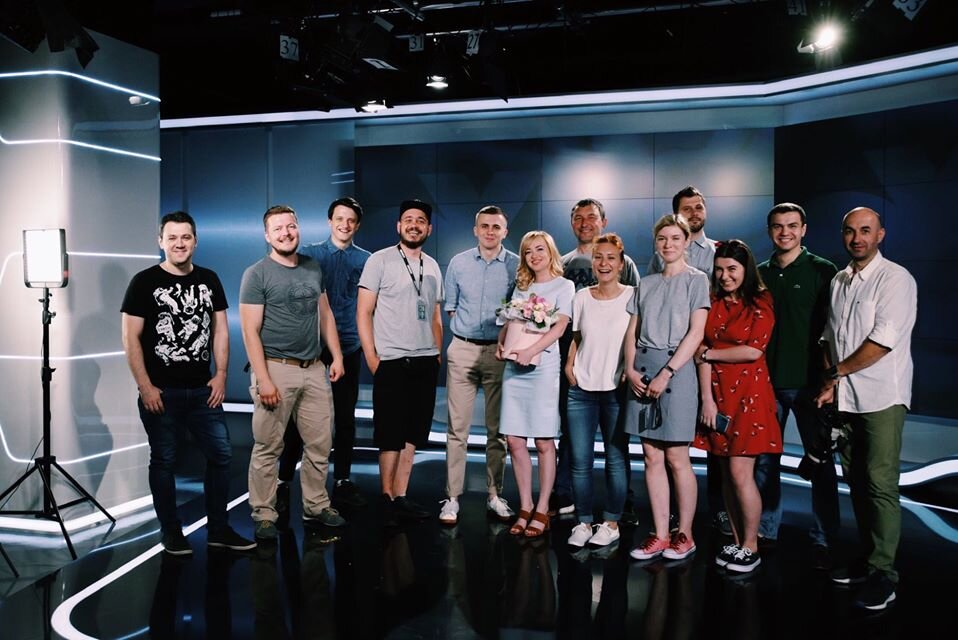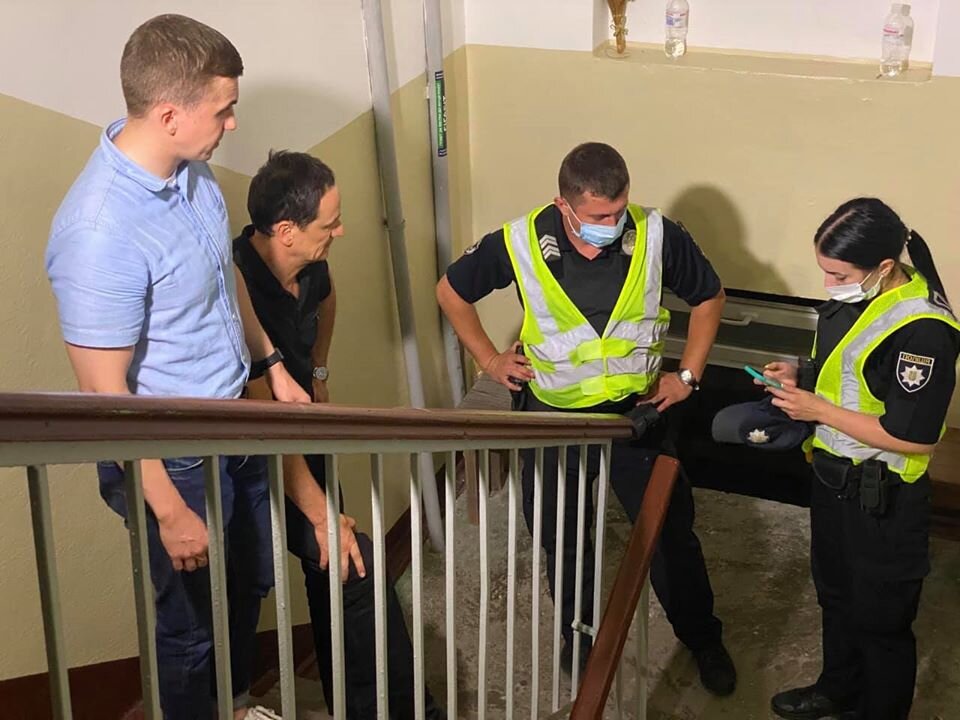Mykhailo Tkach, whose journalism has done more to advance democracy in Ukraine than anyone in law enforcement or elected to public office in recent years in my opinion, has reason to fear for his safety.
And I blame President Volodymyr Zelensky, among others.
Tkach’s investigative journalism with Schemes, part of the U.S.-funded Radio Free Europe/Radio Liberty, has made powerful enemies. Schemes, along with Slidstvo.Info and Bihus.Info, are the nation’s top three sources of investigative journalism.
Today, Tkach – and, by extension, Ukrainian democracy – are suffering.
Tkach recently discovered that, at the end of grueling workdays, his home is not even a sanctuary. For weeks, he has been tipped off by reliable sources that the authorities are after him and, specifically, that law enforcement agencies have been chastised for not doing more to stop his brand of intrepid reporting.
He had an idea of what to expect. Like many investigative journalists in Ukraine, he has been a regular target of hacking attempts, harassment, and physical attacks.
This time, he got one specific tip from a source: That law enforcement agents were considering wiretapping his home, a one-room Kyiv apartment that he shares with Kyiv Post deputy chief editor Olga Rudenko. So, yes, this threat cuts close to this newspaper’s family.
Discovers evidence of surveillance
When Tkach came home on a recent Friday night (Aug. 7) and discovered a mysterious, though inconspicuously tiny hole drilled into his kitchen ceiling, he knew what it might be.
He called the police, his employer, and the company lawyer. Soon, the small apartment was swarming with cops and journalists.
They uncovered in the attic above the apartment (they live on the top floor) three drilled holes, covered up with what looked like a fresh layer of plaster.
Police specialists didn’t seem particularly competent or interested in investigating. They arrived equipped only with a screwdriver, and tried to inspect the holes by shoving a little tree branch down them. So far, the investigation has ended there.
The journalist and his colleagues consider the drilled holes evidence that surveillance devices had been installed.
When, by whom, for how long and for what purpose is a mystery – and will likely remain so, given the current state of law enforcement competence and professionalism in Ukraine.

The team of Schemes, an investigative journalism unit within the Radio Free Europe/Radio Liberty, a U.S.-funded media outlet. (Facebook/Schemes)
Zelensky’s anger over investigations
Tkach has reason to worry because Zelensky called him out publicly in a threatening manner, essentially inviting attacks on him.
And why would the president be angry? Let us count the ways.
It could have been Tkach’s expose revealing Zelensky’s hypocrisy in moving from his house to a lavish presidential dacha, after specifically staking out one of his many populist positions that state residences should be turned into summer camps for children.
Tkach also co-authored Schemes’ story on recordings showing that Denys Yermak, the brother of presidential chief of staff Andriy Yermak, was auctioning off state positions to the highest bidders.
He showed how cars and motorcades carrying Zelensky, ex-President Petro Poroshenko and other powerful people routinely break traffic laws to get around traffic jams.
He also told the public how Zelensky’s top friends and aides, including Security Service of Ukraine chief Ivan Bakanov and top aide Serhiy Shefir, attended the birthday party of notorious oligarch Ihor Surkis, exposing Zelensky’s “new faces” campaign – of not wanting to have anything to do with the corrupt old elite – as a lie.
He showed how oligarchs, politicians and other top officials routinely disobeyed the COVID-19 quarantine, flying their jets to Europe even as borders were supposedly closed and, at home, having restaurants opened specifically for them.
Also, Tkach blew the whistle on many meetings that Zelensky tried to conceal with oligarchs Ihor Kolomoisky, Victor Pinchuk, Valeriy Khoroshkovsky and tainted ex-officials.
Taking on Kolomoisky
And perhaps no one has to look further than Schemes’ coverage of Kolomoisky, who cost taxpayers $5.5 billion by taking out loans from his former PrivatBank that he never repaid, forcing the state to take over and recapitalize the fleeced institution.
Tkach interviewed Kolomoisky after his Poroshenko-era exile upon return from Israel in 2019. He also chronicled Kolomoisky’s birthday party in Switzerland in 2018. Among the guests: comedian Zelensky, whose entertainment shows were broadcast by Kolomoisky’s 1+1 television channel.
Audiences have responded approvingly, the clearest sign of gratitude for this most difficult type of journalism. Schemes’ investigations routinely get hundreds of thousands of views, sometimes more than 1 million. Tkach’s speech in parliament on freedom of speech last year got more than 2 million views on Facebook.
His fellow journalists know his value. The community has given him well-deserved awards, including the special Pavel Sheremet Award, given out by Ukrainska Pravda, in 2017. A year earlier, he won “Teletriumph,” the Ukrainian alternative to Emmys, as the Best Reporter. Announcing the award was none other than Zelensky.

Mykhailo Tkach, a journalist at Schemes, an investigative journalism unit within the Radio Free Europe/Radio Liberty, talks to the police near his Kyiv apartment, where he discovered evidence of possible surveillance on Aug. 7. (RFE/RL)
Zelensky makes Tkach a target
But as president, Zelensky made Tkach a target in very unpresidential public comments, which is why I blame him. At a press conference in May 2020, Zelensky started speaking about Tkach after an unrelated question from another RFE/RL journalist. He berated him for several minutes, describing his work as “insolence” and said that “his parents didn’t do a good job” raising him.
Earlier, in July 2019, when Tkach approached Zelensky for a comment, the president referred to him as “that boy.”
While not in the same category as President Leonid Kuchma caught on tape allegedly ordering a hit on journalist Georgiy Gongadze 20 years ago, or U.S. President Donald J. Trump calling journalists “enemies of the people,” such comments by a sitting president invite attacks on the journalist he singles out.
They can be taken as a signal for action both by subordinates of the president and by enemies seeking to frame Zelensky. The president has to understand the weight of his words and the consequences that they can have.
At the very least, his words can signal that if something bad happens to the journalist, no one will solve the case and those who carry out the crime have nothing to fear.
Justice For Journalists needed
We have plenty of history showing that impunity can be expected to triumph again in this case.
The Kyiv Post recently published an investigative series “Justice For Journalists” which showed that crimes in which journalists are victims rarely get solved in Ukraine. The most famous are, of course, Gongadze, assassinated and beheaded on Sept. 16, 2000, and Pavel Sheremet, blown up by a bomb planted under the car he was driving to work on July 20, 2016. But there are many other victims in Ukraine’s independent history. And both Gongadze and Sheremet faced surveillance before being murdered.
I rate the chances of law enforcement solving the mystery of who bugged Tkach’s home as nil for two reasons: Incompetence and indifference. They just don’t care.
For all anyone knows, the listening devices in Tkach’s home could have been installed during the Poroshenko era. Schemes exposed so much wrongdoing during the ex-president’s administration, from 2014-2019, that retribution could be expected.
Poroshenko’s Maldives trip; physical attacks
Of all the investigations, the one that probably sank Poroshenko’s presidency was Tkach’s revelation of the $500,000 winter getaway to the Maldives, in which Poroshenko allegedly used a fake identity in an attempt to conceal his travels to the public. While Poroshenko lost reelection for many reasons, most related to corruption that he tolerated and reforms that he obstructed, the Maldives vacation starkly exposed the gap between how he lives in comparison to the country he governs, where the average person tries to survive on $500 monthly.
Tkach also got physically attacked by guards for oligarch and Kremlin agent Viktor Medvedchuk after exposing the meetings and favored treatment bestowed on the “Prince of Darkness” by Poroshenko. There were plenty of stories to cover, including the wedding of ex-Prosecutor General Yuriy Lutsenko’s son, exposing the tight connections of the elite and the unlikelihood that any of them had any reason to fear prosecution for crimes in which they were suspected. Tkach was also among the journalists who exposed the nefarious roles of Oleksandr Hranovsky and Ihor Kononenko in the Poroshenko administration.
With horrendous abuses, including murders, taking place against journalists all over the world, invading Tkach’s home and trying to listen in is admittedly not the greatest crime today. But it’s still a serious crime, and one that is compounded by law enforcement apathy and no condemnation or concern by leading politicians. It is also the first time (that we know of) this happened to a journalist in Ukraine’s recent history.
Attack corruption, not journalists
What it all adds up to is that Ukraine’s journey to becoming a civilized democracy is going to take a lot longer than many of us thought.
To be a journalist – and, especially to be an investigative journalist, the elite of the profession – is a thankless and dangerous task in Ukraine. But the light that they shine on dark corners of society is one of the few checks on the unbridled corruption that still runs rampant, robbing Ukrainians of their future.
For this work, we owe a debt of gratitude to the bravery of the Mykhailo Tkachs of the world, who are too few in number.
And my message to the powers that be: Stop attacking journalists and start attacking the corruption they are exposing. And if you can’t do that, at least have the decency to let them enjoy peace and privacy in their own homes.
